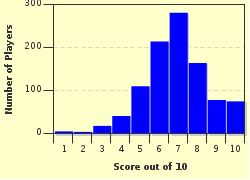Quiz Answer Key and Fun Facts
1. "Living in Puritan New England was hard enough, believe me. Add to that, my husband was supposedly missing at sea and never expected to be seen again. Yes, I took a lover, and became a social pariah due to it. I bore my lover's child alone, and carried all blame on my shoulders. I meekly accepted the social isolation thrust upon me and tried to spare my lover all shame. Which story chronicles my adultery and redemption?"
2. "I was young, high-spirited, and beautiful. My husband was old, dull, and diffident. Everyone thought I was so bad because I took two lovers. What was I supposed to do? I was bored to tears being a country doctor's wife. In the end, I took arsenic, didn't I? I think I have suffered enough. Which book recounts my desperate life?"
3. "I was the absolute poster child for adulteresses. I had a passionate love affair while trapped in a loveless marriage. I teetered between highs and lows, before becoming disillusioned with my paramour. Most importantly, though, I enacted a dramatic suicide involving a train, ending all of my suffering. Which novel replays my melancholy saga?"
4. "You might think this is disgusting, but I committed adultery with my cousin. See, I couldn't marry him, because he was poor. So I married his teacher instead. I know, that wasn't very sensitive of me. I later realized that my husband repulsed me, and I actually didn't like sex. That's why I turned back to my adoring cousin. Many people think I'm horrible. If it appeases your outrage, however, I did return to my husband after several years of adultery--and a few illegitimate children. Where can you read my tale?"
5. "To an outsider, it would appear that I had it all: a kind husband, fine children, and a respectable place in society. Unfortunately, these things were not enough to make me happy. After I engaged in an eye-opening affair at the beach, I realized that society's rules held no place for me. I left my family and tried to become independent. Sadly, no one could understand me and it became hard for me to live my life according to others. I decided to give myself up to the sea...Which book shares my transformational story?"
6. "Unlike my adulterous sisters in fiction, I was not a sad or tragic figure. My husband, Leopold, had been cheating on me throughout our marriage. Not only that, I lived a celibate married life for a decade before seeking solace from outside. I was a singer and my lover was none other than my manager! Ultimately, I decided to stay with my husband, though. Which book gives me my own soliloquy?"
7. "I won't bother trying to defend myself to all of you. The bottom line is that I loved Jay, but married Tom--for his money and social standing. When Jay returned to my life, newly wealthy and obsessively devoted, I broke my marriage bonds and began the affair anew. If he wanted to blow all of his money on me and even take a murder rap on my behalf, who was I to stop him? Unfortunately, he ended up getting killed himself, so I returned to Tom and his safety, money, and life of privilege. Where can you read my sordid tale?"
8. "So, here's the thing: I was a 23-year-old newlywed when my husband became paralyzed 'from the hips down'. I know that his injuries were due to war wounds, and I sympathize with him, but he was no longer able to engage in intimate activities with me. How could I not long for a human touch? And isn't my adultery partly my husband's fault, since he hired that hot gamekeeper? Well, I became pregnant with my lover's child and hoped for a divorce. Which novel tells my tale?"
9. "When I was quite young, my parents shipped me off from Manhattan to London, all in the quest to make a brilliant marriage. I succeeded beautifully--I snagged a duke! But, alas, I didn't realize how empty my life would be, with a cold-as-ice husband and an empty title. I ended up having an affair with a widower, and my dear friends tried to help me evade my loveless marriage. Life doesn't always have a happy ending, does it? Which novel bares my sorrow?"
10. "I was living what I thought was a quiet, contented life as a farm wife in Iowa. Enter one Robert Kincaid: a rugged, divorced photographer. I invited him to my house for some iced tea, and the next thing you know, the room became unbearably hot. Unlike many of my adulterous sisters, I chose my children over my lover. The four days of illicit passion remained with me forever. Where can you read about my brief fall from grace?"
Source: Author
pagiedamon
This quiz was reviewed by FunTrivia editor
agony before going online.
Any errors found in FunTrivia content are routinely corrected through our feedback system.

